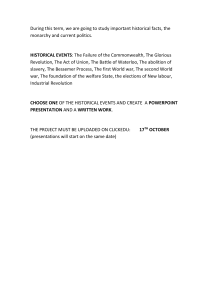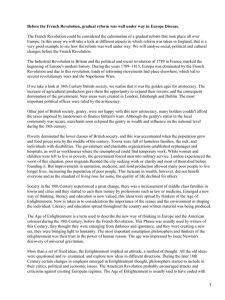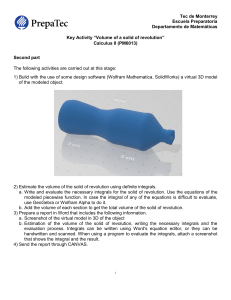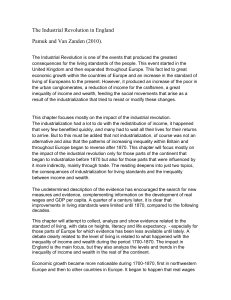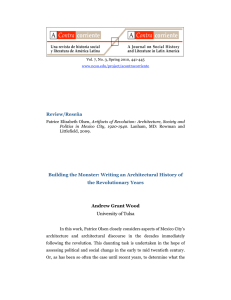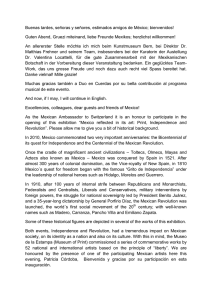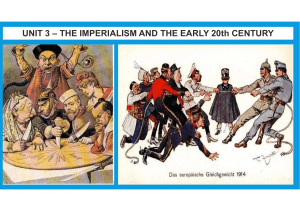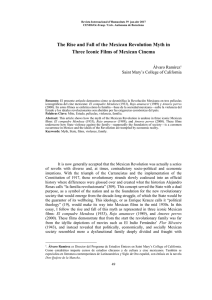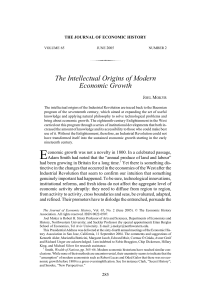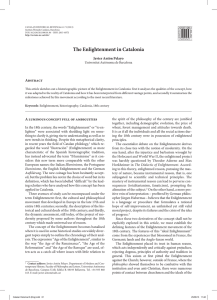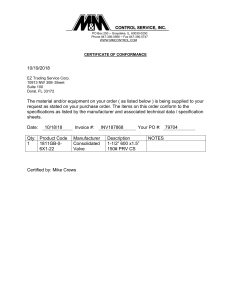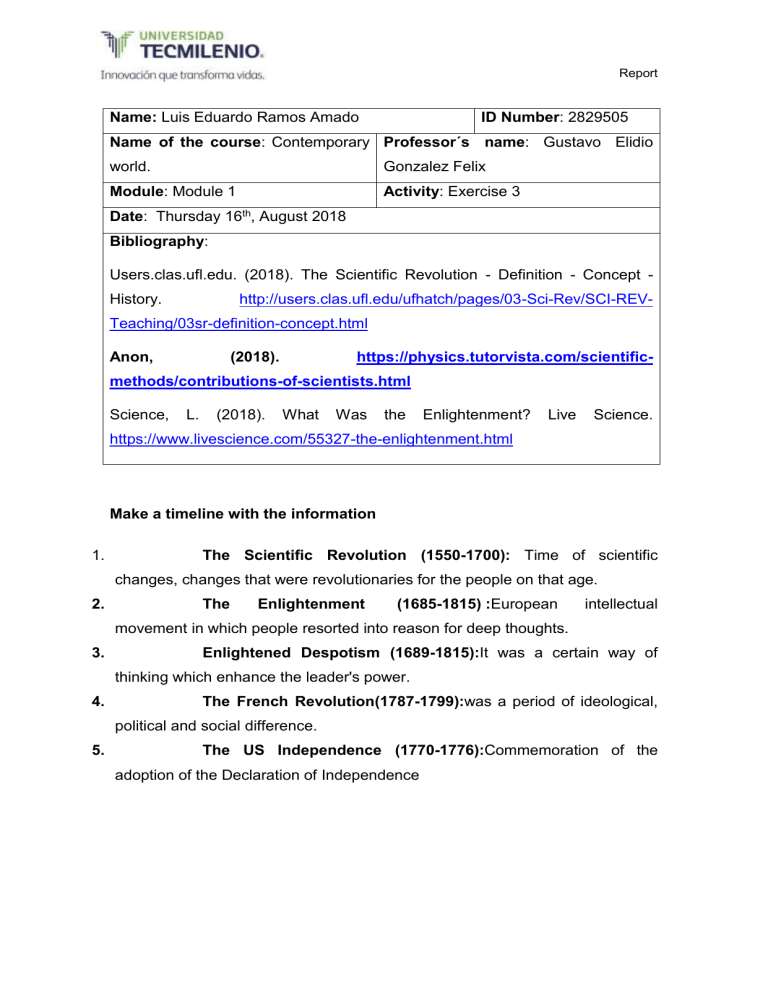
Report Name: Luis Eduardo Ramos Amado ID Number: 2829505 Name of the course: Contemporary Professor´s name: Gustavo Elidio world. Gonzalez Felix Module: Module 1 Activity: Exercise 3 Date: Thursday 16th, August 2018 Bibliography: Users.clas.ufl.edu. (2018). The Scientific Revolution - Definition - Concept History. http://users.clas.ufl.edu/ufhatch/pages/03-Sci-Rev/SCI-REV- Teaching/03sr-definition-concept.html Anon, (2018). https://physics.tutorvista.com/scientific- methods/contributions-of-scientists.html Science, L. (2018). What Was the Enlightenment? Live Science. https://www.livescience.com/55327-the-enlightenment.html Make a timeline with the information 1. The Scientific Revolution (1550-1700): Time of scientific changes, changes that were revolutionaries for the people on that age. 2. The Enlightenment (1685-1815) :European intellectual movement in which people resorted into reason for deep thoughts. 3. Enlightened Despotism (1689-1815):It was a certain way of thinking which enhance the leader's power. 4. The French Revolution(1787-1799):was a period of ideological, political and social difference. 5. The US Independence (1770-1776):Commemoration of the adoption of the Declaration of Independence Report Describe four contributions of each period's scientists. Scientist Contribution Nicolaus Known as the father of modern astronomy, he made Copernicus translations of Greek philosophers and astronomers and (The Scientific postulated heliocentric model of the solar system Revolution) Newton Non for discovering the three laws of motion in which he (The represented natural bodies in a sterile ambient and the Enlightenment) gravity law. David Hume His greatest contribution to Western philosophy is was the (Enlightened development of skepticism and philosophical empiricism. Despotism) Some of his contributions and ideas were: -Innate ideas do not exist; we all require experience, directly. -The mental behavior is governed by custom. Antoine He showed that in a chemical reaction, the amount of matter Lavoisier is the same at the beginning and end of the reaction, testing ( The French the law of conservation of matter in a quantitative way. Revolution) Report Benjamin His scientific research covered topics such as electricity, the Franklin field of mathematics and cartography. He collaborated in the (The US drafting of the Declaration of Independence and the Independence) Constitution of the United States. Complete the following. 1. Describe biographical details of some proponents of the Enlightenment, such as Voltaire and Diderot. What do you find most interesting? (half page) The people who supported the illustration were so impressed by the travel literature and explorations that revealed that the rules of life of primitive man were based on a simple and good ideology; The exponent of this orientation was Denis Diderot, who compared the evil of Christian society with primitive and simple society. This ideology became a symbol of the aspiration to return man to natural conditions. Therefore, Christianity was rejected, trying to reach simple and clear truths. Among the Illustrators prevailed a deistic vision in which the existence of a God was accepted, but he was only seen as the creator of the world. Later, however, an atheistic current spread that denied all spiritual life to the soul. The thinkers of the Enlightenment opposed Catholicism and clericalism as instruments of power because the Enlightenment promoted tolerance contrary to the dogmatic impositions of the church. In the struggle for distinguished tolerance Voltaire formulated the principle of respect for religious and political views of people, which expresses in his treatise on tolerance of 1763. The Enlightenment fought for freedom of thought, but soon after it emerged a critical spirit between social classes and that led to real absolutism. Many nobles felt the weight of absolutism, some aristocrats and members of the clergy used to carry out reforms, and the bourgeoisie no longer accepted to be excluded from the activities of the government. Report 2. Why were some European kings called enlightened despots? The enlightened despots were monarchs who distinguished themselves from the previous ones in the way they ruled. Illuminated monarchs ruled absolutistically on the basis of the principles of the Enlightenment. This means that the monarchs ruled with the purpose of taking care of the development of all their subjects, not only to please the nobility. Although their kingdoms were based on the ideas of the Enlightenment, their thinking about the royal powers was similar to that of their predecessors. The enlightened despots believed that they had obtained the right to rule by birth. 3. Identify three kings that are representative of enlightened despotism, supporting your choice through images and a short biography King Charles III (1759-1788)king of Spain and king of Naples (as Charles VII, 1734–59), one of the “enlightened despots” of the 18th century, who helped lead Spain to a brief cultural and economic revival. Emperor Joseph II (1765-1790) Joseph Benedict Augustus of Austria was an Austrian archduke of century XVIII and soon emperor of the Sacrum Germanic Roman Empire of 1765 to 1790, king of Hungary and king of Bohemia. Czar Catherine II (1762-1796) Catherine II of Russia, called Catherine the Great was Empress of Russia for 34 years, from June 28, 1762 until her death, at 67 years. Report 4. Consider the historical context at the time and indicate the triumphs and failures of the kings who were sympathetic to the Enlightenment. In this period, the sovereigns increasingly met the demands of freedom and equality, but in the sense of keeping everyone equal before them, thus maintaining their power almost intact. This was also possible due to a serious lack of Enlightenment that, on the one hand, criticized the divine origin of real power and, on the other, distrusted any program too democratic, fearing irrationality and the disorderly passion of the people. That is why they accepted the royal authority whenever their own reforms were implemented. Then, some sovereigns could: limit and combat the privileges of the nobility and the clergy, establish freedom of trade, promote public education, improve the tax system. In this way, the living conditions of some States improved, but, in general, the populations continued to be subject to the decision of the constituted power, to remain deprived of the most basic and fundamental rights. The state that became even stronger stems from this situation. Richer and better administered. However, enlightened absolutism had the undeniable merit of promoting economic, social and political reforms to improve the state. For example, Frederick II abolished serfdom, Charles III made improvements in agriculture, Catherine the Great implemented legal and scholastic reforms, while Joseph II introduced religious tolerance. 5. Describe the conditions in which the French people lived before revolution broke out. (half page) The French social system was inherited from the feudal system. The society was unfair in three unequal orders. We can speak of an unequal society because the first two orders, the clergy and the nobility, have honorary and fiscal privileges. Each order is heterogeneous; and within them, individuals are more or less privileged: the high clergy are very rich, while the lower clergy receive only the small portion; only the high nobility receives pensions from the king while the nobility clings desperately asked the rights to survive. As a Report result, inequality increases, the rich are richer and the poor are poorer and poorer. The ranking is done according to the service rendered to each order; it is related to the vocation, the birth, or the esteem accorded to certain roles. The financial crisis, already present under Louis XV, worsens during the reign of Louis XVI. The poor harvests of 1787 and 1788 caused an increase in the price of bread and the people suffered from scarcity. Faced with the crisis and the attitude of the privileged, the bourgeois obtain from the King the convocation of the States-General (the meeting of the representatives of the three orders) for 1789. To prepare them, the notebooks of the grievances are written: each order collects the claims in the whole kingdom and elect representatives. 6. Identify and briefly explain the heritage of the French Revolution which has lasted to our days. (at least three lasting aspects) Freedom: The main contribution of the French Revolution is democracy: citizens are now free and equal rights, and Edmond "still believes". The birth of the Republic: The French Revolution allowed the establishment of the Republic. the mobilization of the people was "the first attempt at republican construction in France". The modernization of France: The Revolution facilitated "the entry of France into modernity" thanks to the reforms put in place under the reign of Napoleon. Ana rightly notes that "the civil code is born thanks to Napoleon Bonaparte, on the ashes of the Revolution.The administrative organization of France that continues until today also dates from this time". 7. Reflect on and write the significance of each contribution. Deep structural causes, which have been combined with other causes due to the economic situation of the period. The revolution is not due to a single event but to a set of events which, together, have created a shock of sufficient Report importance to bring about irreversible transformations in the conception of the organization of political power, society and freedoms individual. 8. Indicate at least three conditions that permitted the thirteen colonies of North America to win their independence. The Thirteen Colonies had a high degree of self-governance and active local elections, and they resisted London's demands for more control. 9. On what continent (Europe or America) did the ideas of the Enlightenment first triumph? And what factors of that environment are credited with this triumph? Europe, the people who supported the illustration were so impressed by the travel literature and explorations that revealed that the rules of life of primitive man were based on a simple and good ideology; The exponent of this orientation was Denis Diderot, who compared the evil of Christian society with primitive and simple society.
